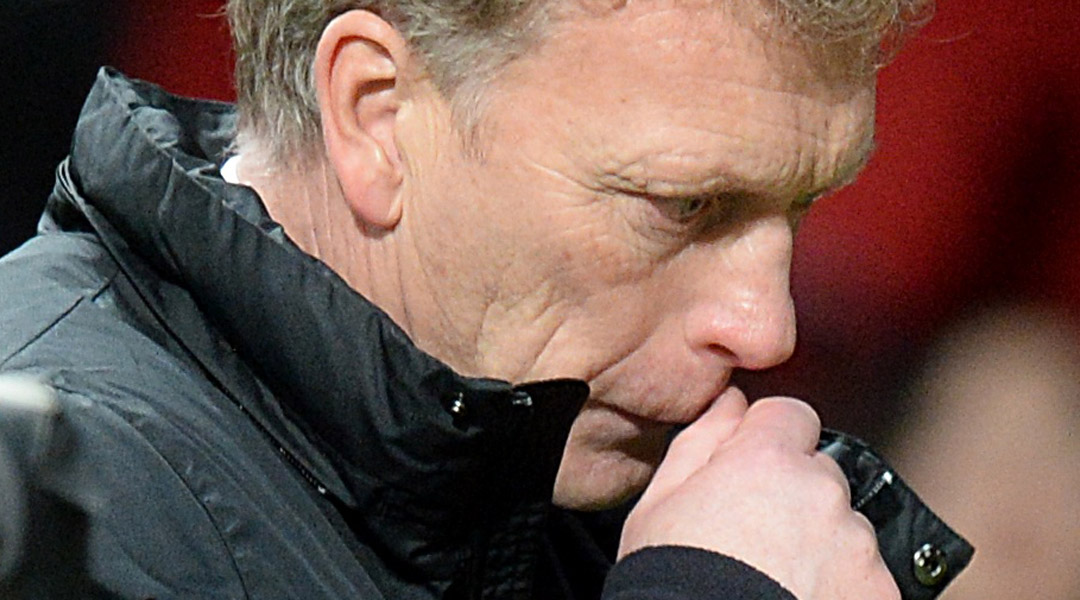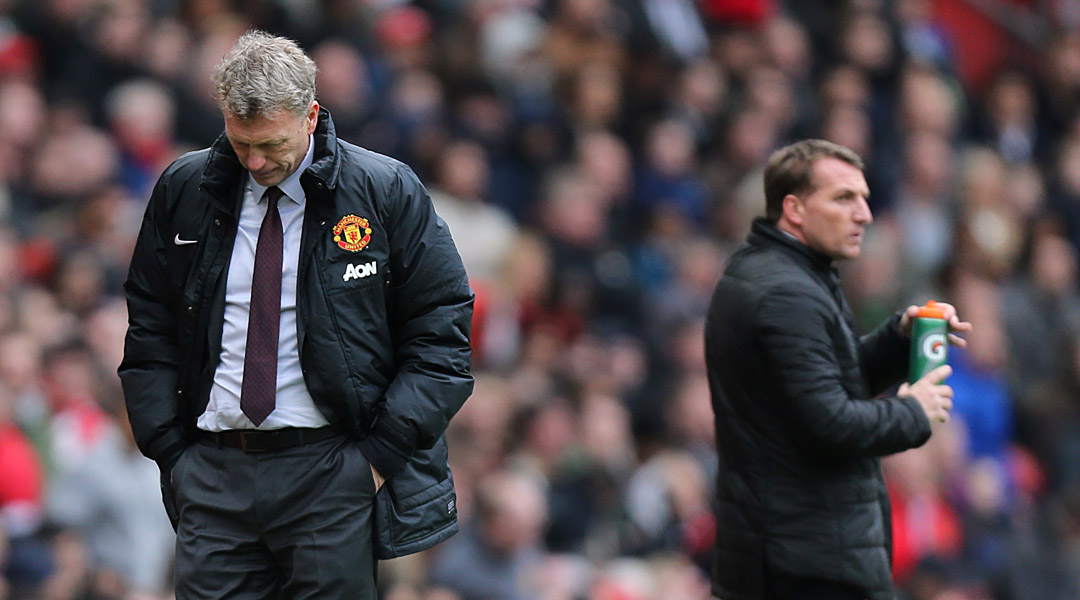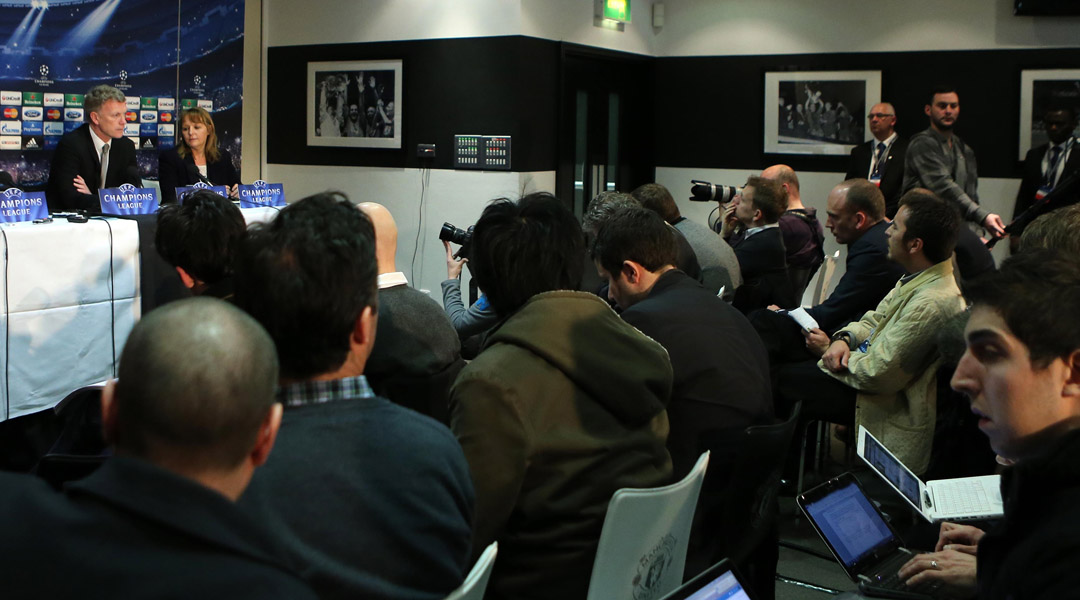How Manchester United became underdogs - and why it could make things even worse
Jonathan Fadugba on the Old Trafford side's dramatic plunge, and suggests why David Moyes is going about it all wrong...

A strange thing happened in the days following Manchester United’s season-saving comeback against Olympiakos. As the Champions League quarter-final chatter grew ever louder, a cold, stark truth emerged, like a gleaming pear whelk on the sandbanks of a tropical beach. Everybody wanted to draw United.
Even before the ceremonial ruffling of balls in pots paired United with behemoths Bayern Munich, the 20-time champions of England were almost universally disregarded. Beforehand, bookmakers had them as 22/1 outsiders; the draw encouraged a further drift to 32/1 no-hopers. PSG coach Laurent Blanc said it "would be nice" to face the Red Devils. Nice, like a trip to visit your auntie.
Kicker said Bayern could "relax" against an "ailing" team, noting with some surprise that, unusually for Manchester United, their own manager David Moyes had billed them as outsiders.
United were the plum draw, a changing room of chumps there for the taking, the Olympiakos of the last eight, the bye to the semi-finals.
Reaction to the draw in Germany was enthusiastic at best, condescending at worst. “Luck for Bayern,” screamed SportBild’s lead article. Kicker said Bayern could "relax" against an "ailing" team, noting with some surprise that, unusually for Manchester United, their own manager David Moyes had billed them as outsiders. Der Spiegel described David Moyes’s team as "mediocre" with "many stars but no team".
Before we forget – for it already seems a distant memory – this is virtually the same United that won the title by 11 points last season, breezing to the finish line with urgency and panache, and becoming the first team in history to win 25 of their first 30 top-flight games.
Get FourFourTwo Newsletter
The best features, fun and footballing quizzes, straight to your inbox every week.
Few clubs have a finer pedigree in Europe than the one currently getting so much stick that even Tesco Mobile's Twitter account had a pop.
United, after all, have been in three of the last six Champions League finals, and over the past decade no team has reached European football’s showpiece finale more times. So how did this perception change? And are we entering a new era, that of Manchester United as plucky underdogs?
From winners to tryers
Unfortunately for Moyes, the unavoidable truth is that much of the blame for this shift in perception lies squarely at his door. As much through his words as his actions or team selections, Moyes must bear responsibility for an almost overnight switch in United’s public perception from English football’s most formidable opponent to one living by the Glaswegian’s most prominent press-conference buzzword: hope.
A major transition period was always going to be necessary after Sir Alex Ferguson’s uniquely successful 26-year stint, but the crash from defending champs to dead-beats has been unexpectedly meteoric. The gradual rebranding of United as also-rans has been a tale of both deeds and declarations.

First, the football. On the pitch, Moyes’s United have gone a goal behind in 15 of their first 31 league games, only thrice reversing it to a win – against Stoke, Hull and Sunderland. The last time they lost as many games in a league season, Cher topped the charts with The Shoop Shoop Shoop Song (that's 1990, pop-pickers).
They’ve amassed their most home league defeats for 12 years, won just one of 13 games against the top nine, been beaten home and away by both Manchester City and Liverpool for the first time in history, have fewer points at home than Hull or Norwich and sit six points behind Moyes’s old team Everton, who have a game in hand. Generally speaking results have been tolerated: even during the humiliating 3-0 home defeat to Liverpool, the visitors' celebrations were drowned out by vocal and defiant support.
Glass half empty
However, as they prepare to face Bayern Munich in what will likely be their last Champions League games for 18 months, what is remarkable is the almost hopeless acceptance of United's long-shot status. Moyes’s micro-management style, crippling modesty and dour conservatism have undoubtedly weakened United’s position, to the point that even a Europa League place is not guaranteed.
Outwardly, pessimism appears to be an inherent part of Moyes’s DNA. Indeed there’s an argument that it applied as much during his time at Everton as it does now, that the blinding searchlight of scrutiny on Moyes’s face at Old Trafford has only served to highlight wrinkles that already existed.
Man City 4-1 Man Utd (Sep 13)
Man Utd 1-2 West Brom (Sep 13)
Man Utd 1-2 Swansea (Jan 14)
Man Utd 2-2 Fulham (Feb 14)
Olympiakos 2-0 Man Utd (Feb 14)
Man Utd 0-3 Liverpool (Mar 14)
There are those at Goodison who still accuse Moyes of playing a Jedi mind trick during his time in charge, in that he took one of England’s biggest clubs in terms of league titles won (and the best for number of top-flight seasons) and reduced them to the narrative of a donkey in a stable of thoroughbreds. The "knife to a gunfight" comment ahead of a trip to Manchester City in 2011 lives long in Evertonians’ memory, and Roberto Martinez’s unbridled optimism has been welcomed like a gulp of fresh air after a stiflingly hot sauna session.
Even before his team were paired with Bayern, Moyes had downplayed his team's chances: "I think we probably now, depending on the draw, will go in as underdogs in a lot of the games." He’d written United’s Champions League chances off as early as September, saying “you need five or six world-class players,” and that he didn’t have that.
There were the comments about Liverpool being favourites ahead of that 3-0 reverse, witheringly ridiculed by Brendan Rodgers, who twisted the knife with uncharacteristically callous glee.
And then Manchester City, who doled out another 3-0 humbling, playing at a standard Moyes said United should "aspire to" – an unnecessarily painful and unpopular remark. “March was a real difficult month, we played a lot of good sides. We’ve got a lot of work to do but while we’re playing a lot of the big sides it could be difficult,” he stated, perhaps not realising his environment. Big sides? Such comments have had a reducer effect, a drip-feed dragging expectations down to a manageable level.
Underdog mentality and performance
The psychological effects of adopting an underdog mentality can go either way. “Some players are used to being at clubs where they’re underdogs, and they adapt to that and develop a certain fighting spirit,” says Richard Nugent, mental coach and MD of Success in Football, who specialise in sports psychology.
“However, if a player isn’t used to being in that position then it’s a very different mindset. From being used to a dominant position and thinking about dominating games, it plants the seed that they won’t. Even before they’re on the pitch they can be thinking about the fact that they’re going to be under pressure or that the other team might be on top. And that’s when the psychological effect really kicks in.”

These changes in mindset have a proven impact on performance, explains Nugent. “It's different if you’ve got players, as Manchester United have, who are only really used to being not only in a winning team but one that dominates games. One of the key ways in which they can be affected is their confidence. Most people think it's something that comes from the outside, but actually confidence really comes from what you think about and what you pay attention to most."
Internalised managerial messages can considerably change players' perceptions, says Nugent. “If in the lead-up to a game, United are doing extra work on defending - or even just when players are by themselves thinking about the game unfolding - and they’ve heard the manager talking about them being an underdog and being under pressure, that’s what they pay attention to."
Nor are the effects all in the mind. "It can affect them physically. It can reduce their energy and reduce how strong they feel from moment to moment. The psychological effects can then trigger physiological effects and lead to, for example, being slower off the mark, weaker in the challenge - some research has even shown that it can make you slower across the ground. So mentality can have a huge impact psychologically and physically.”
Positive underdogs
Of course, assuming the role of the underdog isn’t always a negative thing - any number of lessons from history have taught us that, from the New York Jets winning the 1969 Superbowl to the Crazy Gang's ball-grabbing band of brothers in the late '80s. Down in London, Jose Mourinho has been playing the underdog card all season but somehow it’s seen as a clever mind game – perhaps helped by the fact that Chelsea are top of the league, 18 points above Manchester United.
Nugent insists Moyes will have to change his tune if he is to succeed at Old Trafford – in private, if not in public. “Mourinho’s message behind closed doors is different: I’ve no doubt that although Mourinho plays things down to the media, he goes back to his players saying ‘I expect us to win’. I’m sure Moyes is saying that too, but there comes a point where absolutely he’ll have to do that publicly as well. I think that will be when he has more of his own players in.”
While Moyes’s signings, tactics, team preparation, youth record and ability to motivate and inspire players are all under forensic examination, he continues to enjoy the backing of the United board. For now, a sacking seems unlikely even in the summer.
It took me three or four years to understand fully the politics and requirements, the demands and pressures...
“No manager is prepared for the job at Old Trafford,” as Alex Ferguson – Moyes's staunchest supporter – said in 1994, looking back on a tumultuous opening few years in charge. Ferguson later admitted that during this time he had become like a hermit, “sneaking around corners as if some kind of criminal.
"It took me three or four years to understand fully the politics and requirements, the demands and pressures," he admitted.
Ferguson will identify with Moyes’s struggle. What he won't identify with for too much longer, one senses, is United's current defeatist mentality. Its short-term result is that Manchester United head into the Champions League quarter-finals as massive outsiders: the odds on them beating Bayern at Old Trafford are among the longest ever offered for a United home win.
If the psychological ploy works, Moyes will take credit. If not, this temporary recasting of United as plucky underdog will have proved a failure. Within the space of a year, Goliath has been brought down to David's level.
